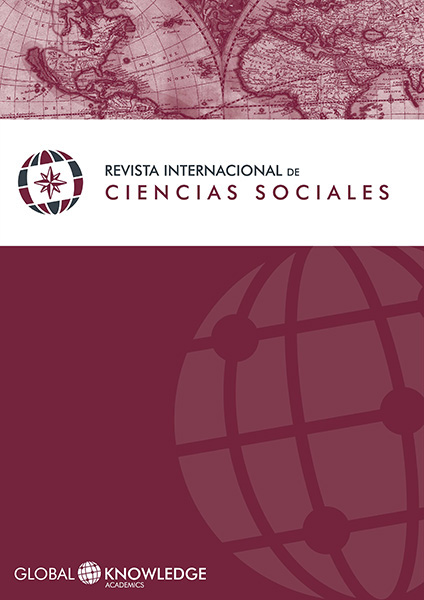Pedagogical Practice: an Experience Based on Research Action Perspective
DOI:
https://doi.org/10.37467/gka-revsocial.v3.811Keywords:
Qualitative Methodology, Social Sciences, Teaching, Learning, Research ActionAbstract
This research is based on qualitative methodology perspective of research action. The epistemology is found upon a social-historical approach; it is related to social sciences, also called “human sciences”, because it includes the study of man, its nature, development, relationships, cognitive and creative potential, affective interactions, values, beliefs and feelings. The aim of the research was to transform pedagogical practices of mathematic teachers at the elementary school “Rosario Almarza” at Trujillo State-Venezuela. The study reflects on teachers´ classroom activities and how they perform them. The information was gathered through field notes, interviews, written artifacts, photos and audio/video recordings. Data analysis was done through “source triangulation technique”. This study generated positive results so teachers could improve their pedagogical practices, and act as meaningful learning mediators; also offered a constructivist strategies manual as handout and orientation. The research offered students the opportunity to build learning from cooperative work.
Downloads
Global Statistics ℹ️
|
383
Views
|
188
Downloads
|
|
571
Total
|
|
References
Beltrán, C., Fonseca, M y Peña, A. (1999). “Una Propuesta para la Enseñanza y el Aprendizaje de los Sistemas de Numeración”. Revista EMA 4(3), p. 9.
Díaz, F. y Hernández, G. (2002). Estrategias docentes para un aprendizaje significativo. México: McGraw-Hill.
Frankena, W. (1975). Tres filosofías de la educación en la historia. México: Uteha Ediciones.
Gallego, R y Pérez, R. (2001). La enseñanza de las ciencias experimentales. Colombia: Magisterio.
Giraldo, I., Pantoja, M y Serrato, C. (1999). “Una Propuesta para la Enseñanza de la Noción de Conjunto y sus Relaciones”. Revista EMA 4(3), p. 9.
Laburu, C. (1996). La crítica en la enseñanza de las ciencias: Constructivismo y contradicción. Brasil: Investigación y Experiencia Didáctica. DOI: https://doi.org/10.5565/rev/ensciencias.4243
Mardones, J. (1991). Filosofía de las ciencias humanas y sociales. Barcelona: Editorial del Hombre.
Marina, J. (2000). Teoría de la inteligencia creadora. Barcelona: Editorial Anagrama.
Martínez, M. (1999). La Nueva Ciencia. Su desafío, Lógica y Método. México: Trillas.
Pérez, G. (1994). Investigación cualitativa. Retos e interrogantes. Madrid: La Muralla.
Rojas, R. (1999). Investigación-acción en el aula. Enseñanza-aprendizaje de la metodología. México: Plaza y Valdés Editores.
Ruiz, Y., García, N., García, P y Quintero, E. (1998). “Una Propuesta de Enseñanza para abordar la Representación de Fracciones Equivalentes en la Recta Numérica”. Revista EMA 3(3), p. 10.
Sarmiento, M. (2004). “ La enseñanza de la matemática y las nuevas tecnologías. Una estrategia de formación permanente”. Trabajo doctoral. ULA-URV.
Terán, M., Pachano, L. y Quintero, R. (2005). “Estrategias para la Enseñanza y el Aprendizaje de la Matemática”, Fondo Editorial “Programa de Perfeccionamiento y Actualización Docente” de la ULA, Mérida.
Terán, M., Quintero, R. y Pachano, L. (2007). Enseñanza de la Geometría en la Educación Básica. Mérida: Fondo de Ediciones Universitas.
Vizcaya, F. (2002). “Los vicios. La tarea profunda de educar”. Revista DERECHO Y SOCIEDAD 2, p. 37.
Downloads
Published
How to Cite
Issue
Section
License
Those authors who publish in this journal accept the following terms:
-
Authors retain copyright.
-
Authors transfer to the journal the right of first publication. The journal also owns the publishing rights.
-
All published contents are governed by an Attribution-NoDerivatives 4.0 International License.
Access the informative version and legal text of the license. By virtue of this, third parties are allowed to use what is published as long as they mention the authorship of the work and the first publication in this journal. If you transform the material, you may not distribute the modified work. -
Authors may make other independent and additional contractual arrangements for non-exclusive distribution of the version of the article published in this journal (e.g., inclusion in an institutional repository or publication in a book) as long as they clearly indicate that the work was first published in this journal.
- Authors are allowed and recommended to publish their work on the Internet (for example on institutional and personal websites), following the publication of, and referencing the journal, as this could lead to constructive exchanges and a more extensive and quick circulation of published works (see The Effect of Open Access).













